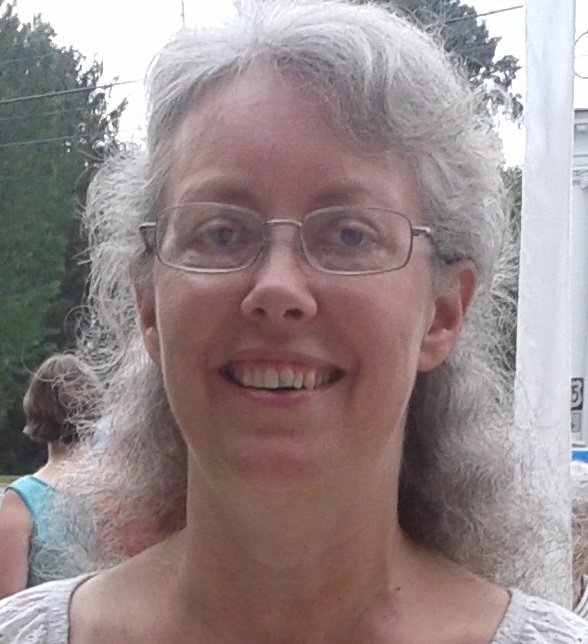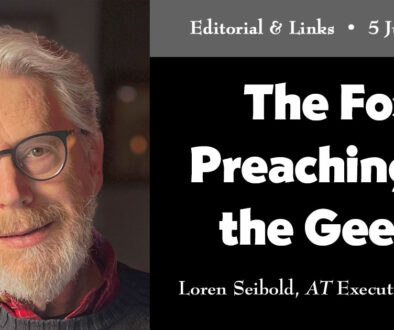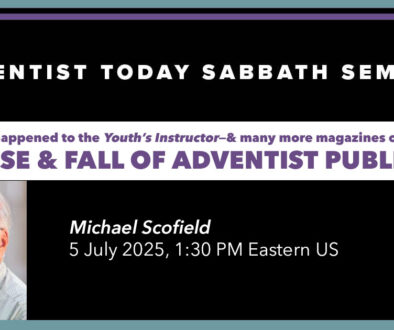Adventists in the Arts: Daniel and Revelation and Rap

By Debbonnaire Kovacs, 9/7/2017 The Lesser Light Collective is a group of around 30 mostly young, diverse Adventist musicians who have created two albums of unique and appealing music, detailing the entire biblical books of Daniel and Revelation. This is a profile of one of the founding musicians, Lee Givhan, who, with his wife, does most of the touring and publicizing of the albums all over the United States.
This part of the story begins with two teenagers in a school cafeteria. Lee Givhan loved to rap, and one day he saw another young man beat boxing on an in-school televised talent show. “I thought it was the most interesting thing on,” Lee told me. He met the young man not long after that. Neither of them knew it was a meeting destined to change their lives, bringing them into contact with REACH Philadelphia, and later to a nationwide ministry.Lee told me the story:
“Ironically, I had a music class where the teacher just decided to stop teaching because he was professional and didn’t take this basic class seriously. That was fine with me. One day I went to the lunch room next door to the class, and I saw that same kid beat boxing in the cafeteria with a guy doing gangster rap. When I first started I did that, too, because I didn’t know what else to do, but pretty soon I stopped and started doing more honest things—things about my life. So seeing that guy doing that, I knew that was not his real lifestyle, it was just fashionable. I didn’t respect that. I wanted to do something better. I wrote something and walked up and asked if I could share it.”
I interrupted here. “Wait—you wrote something right then, or do you mean you had something you’d already written?”
“I just sat down at a table and wrote something. Then I asked if I could share it. They liked it, so from then on I went there instead of music class.”
The young man doing the beat boxing was Delon Lawrence, and the year was around 2003.
About a week later, a week or two before spring break, Lee asked Delon if he wanted to record an album during the break. Lee’s mother, Alyson Scott, had always been “super-supportive,” Lee told me. He kept using her portable tape recorder, so she got him a multi-track recorder for his birthday. Lee said, “Delon did all the music in about two days. He was super creative. He did it all pretty much off the top of his head. Over the next two weeks I wrote my part.”
They named the Album “The Beginning and the End.” Lee says he thought it was the beginning of his music career and the end of the two young men’s time together. Neither of them thought they would do anymore together after that—and, he adds with a laugh, each thinks the title was his idea.
They sold 300-400 CDs at school for $4 each.
They made a second album, “Dreams of Linda,” which Lee characterized as different songs about high school, teenagerhood, and angst, which also sold pretty well.
“That was when I decide I wanted to do music as a career.”
By this time, Lee had learned that Delon was a Seventh-day Adventist. “Everybody knew him as super Christian guy and as a beat boxer. Everybody in the whole school knew him. Associating with him and being together with him all the time from that point, everybody got to know me too.”
One of the reasons the students all knew Delon was because he would sit in the cafeteria at lunch time and preach about prophecy. Because the kids all liked his beat boxing, they would listen when he expounded on Revelation.
Lee had been raised as a Quaker, even attending Quaker schools, but says he “didn’t have much, if any, Bible teaching. I believed in God and was spiritual, but I don’t know if I ever really embraced it or considered myself a Quaker.”
So he wasn’t too sure what he thought about Delon’s beliefs, some of which seemed pretty weird. But he knew he wanted to do rap with him.
Lee had been rapping since the age of 14, “just for fun.” In 9th grade, a couple of things happened which made him, as he put it, “fall out of love with school.” He said schools encourage conformity, not creativity. Once he wrote a paper he was very proud of, but it got a 0 because it didn’t match the assignment well enough. “That,” Lee told me, “was the turning point.”
He got into poetry as a good creative outlet. He had been playing a lot of basketball, which he also loves, but poetry gave him a way to express himself, as well as to connect with others in ways that were not directly social, since he was shy, especially around new people. He went to various open mics and poetry slams, where his nickname was Ghost because “it was as if I didn’t exist between events.”
“The definitive turning point came when I was playing basketball and a girl blocked my shot. This mean guy made fun of me. He was really obnoxious, and I was really down over it. There was an open mic that night. I was feeling so bad I didn’t want to go, but I did, and I shared some songs I’d written. People really liked them—and it was an amazing shift in my mood! I realized basketball is momentary; music lasts.”
The two young men were in for some rough weather, however. Delon’s family believed that what he was doing was “a curse of the devil.” Delon himself had very confused and ambiguous feelings about it, and he and Lee were off and on several times. Delon would say they couldn’t make music anymore, but then they would make more.
“At one point,” Lee told me, “for whatever reason, he said that and I felt he was really serious this time. I asked, ‘What can we do so we can work together, so you won’t feel bad?’”
They made a contract that Lee would read the Bible for 15 minutes a day, pray for the Holy Spirit, and they wouldn’t make music on Sabbath.
“So I was reading the gospels, praying for the Holy Spirit, and I found myself very attracted to Jesus and how he lived his life,” Lee said. “He made big claims about who he was and what it meant to follow him. I wrestled with that.” It wasn’t long before Lee was reading the Bible, not to keep a contract, but because he wanted to.
Around 2009, with the two men still working together, several major events converged in Lee’s life. First, he dropped out of college to do music. He had been taking business and marketing to “be smart about my music career, but I didn’t have the patience and discipline. I just wanted to make music.”
Second, his next door neighbor, who was road manager for The Roots, a Philadelphia-based hip hop group that had some top-40 hits, took him to meet their manager and later other members of the group. “They listened to our music and liked it, so they used one of Delon’s beats for their album—that was our first major record company contact.”
The third major event was when Lee won a competition to open for the rapper, Common. “Then I found out the concert was on Sabbath. I wrestled with it; I was just learning about the Sabbath. Ultimately, I decided to do it, and I now regret it. I just want to show the tug and pull that was happening at that time.”
Then came another life-changing event. Lee’s father had had two children with a first wife, and for the first time, Lee met his half-sister. “She was a Christian, and explained certain things to me about gospel more clearly, and it helped me accept Christ. They encouraged me to get in contact with my grandmother who, I learned, was Adventist.”
Lee began reading Ellen White books he got from an Adventist church and became an Adventist on his own, telling Delon he wanted to be baptized. He met a girl who was working for the Pennsylvania Youth Challenge, a ministry of Chestnut Hill Seventh-day Adventist Church in Philadelphia {REACH did not yet exist here, but would in a couple of years]. He signed up for it and “talked Delon into it.”
He met Jennifer Schwirzer, a musician who was working on some music about the book of Revelation.
Again, Lee tells the story:
“She showed it to me, and I was like, ‘Man, that’s crazy!’, because it was a rap she had written. She shared another song and asked me to write a rap aboutWilliam Miller and Revelation. She asked Delon to work on the project, too.”

They knew it would not be easy; rap is not exactly your go-to church music genre. Jennifer was aware of the controversy, and admitted she never thought she’d be working with rappers. More and more people started getting involved. It grew into about 30 people, mostly young, diverse as to race and background. Together they created a group called The Lesser Light Collective (TLLC). Lee says they had three objectives: to raise awareness of prophecies in Daniel and Revelation in younger church members who may not hear them; to raise awareness that Christ is the center of the book in older members who know the prophecies but might not have heard them in a Christ-centered way; and to launch the careers of young Adventist musicians.
Lee told me, “I didn’t know when I came to the Adventist church if there was a place for what I do. People were sharing sermons with me from different churches where pastors really speak against any kind of what I would call African American music. I realized doing this as a career in SDA churches could be difficult. You’re doing rap with people mostly over 50.”
In 2013 TLLC released a full-length, two-CD album they called “The Lamb Wins.” A musical journey through the book of Revelation, the album is part song, part narration, and Lee raps on some of the songs. It caught the attention of Adventist Today’s Executive Director, Monte Sahlin, who thought it was extremely well done and well-balanced, and gave a copy to me. I believe I did a short note in our Poetry & Arts section, but I didn’t do a feature at that time. [You can hear Delon and Lee informally do one of the songs, “Choose Your Beast” here. There is a lot more there, too, if you search either of their names–or for that matter, any artist from the bio page of TLLC.]
Delon and Lee were now full-time missionaries for REACH Philadelphia. The group began trying to figure out how to do tours, but it’s impossible (even with Kickstarter and donor funding) to get such a big group on the road. So Lee and his new wife, Hillary, despite what Lee characterized as a “rocky road and having put myself in such a pickle by dropping out of college and doing this,” committed to spending the first two years of their marriage touring. They travel the country, talking about the project, Lee sings the songs he can alone, and they sell CDs. They also have other members of the group with them when that logistically works out, which makes it possible to do more songs.
The group has just produced a second CD—“The King Dreams,” about the book of Daniel. I had the privilege of hosting Lee and Hillary at my home, near the end of their 10-week tour of this album. They seemed tired, but in good spirits, and said the trip had been a great blessing, and that they were actually managing to support themselves on their work.
Lee sent me an email update on this tour, which has just ended:
“Man, we saw God show up in so many ways. For one, the timing. Even though it seemed like a badly timed tour (we didn’t plan around the camp meetings that were happening in the areas we were going through) God protected us from the natural disasters that hit Texas, Tennessee, Oregon and California. Seems like right after we would leave a place, we would hear on the news about it getting tragically hit by a hurricane or fire. Then there was the time we did an Airbnb at a Christian’s home in California near Fresno and found out from the mother there that her 11-year-old girl only wanted to read Daniel and Revelation. They bought the Daniel & Revelation coloring book we made called Vibrant Visions* for her before we left! We also did a concert in Washington where during the appeal, a girl came forward that we later found out had called herself an atheist before that night. God is so good!”
*The Vibrant Visions coloring book as well as other material is available in the store on the website.
The group’s three goals are being well realized. If you go to TLLC’s website and look at the artists’ bio page, you will find names of musicians whose careers have taken off. Lee also credits Jennifer Schwirzer with helping to launch Delon Lawrence’s career.
Young Adventists enjoy the music and may learn about the prophecies as they are given in the biblical record.
As for older Adventists, Lee says, “We’ve had older people with revivals in their life and they wanted to start over with God. A lot have been very blessed despite what they thought—many say, ‘I hate rap, but I’ve been blessed by what you did.’” He added, “We’re not trying to change musical views; but it’s happening—people see that styles they thought were of the devil can be used by God.”
They have presented in a few non-Adventist churches, but most churches are not interested once they hear the group is Adventist. “They know we have really different beliefs about those two books of the Bible,” Lee said.
Perhaps their call, for now at least, is more within the Adventist denomination. Perhaps they’ll start crumbling the walls we still have in our midst—walls confining creativity, dividing races and sexes, dividing “conservative” from “progressive” from “liberal.” Perhaps the Lamb will win, just as the king’s dream shows him doing.
Featured photo shows members of TLLC from left to right: Miriam Bernstein, Bekah Reynolds, Marina Acevedo, Ranny Wenur, Alison Brook, Christa Deana, Jennifer Jill Schwirzer (conducting), Neville Peter (top), Zachari Young, Andrew Carroll. Photo by Krystal Irrgang.
 Debbonnaire Kovacs is a speaker and the author of 28 books and over 700 stories and articles for adults and children. To learn more about her work or ask her to speak at your organization, visit www.debbonnaire.com.
Debbonnaire Kovacs is a speaker and the author of 28 books and over 700 stories and articles for adults and children. To learn more about her work or ask her to speak at your organization, visit www.debbonnaire.com.




